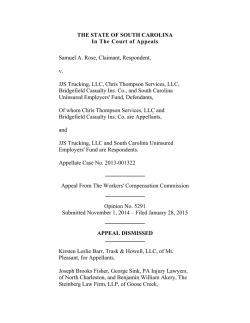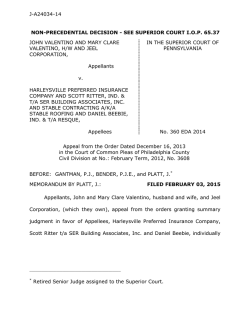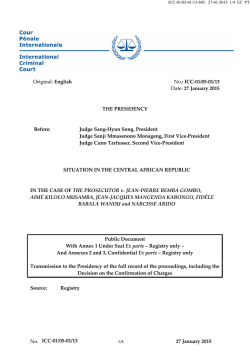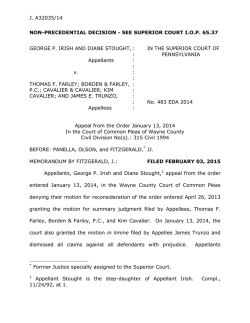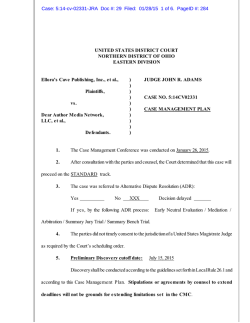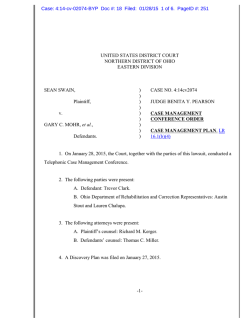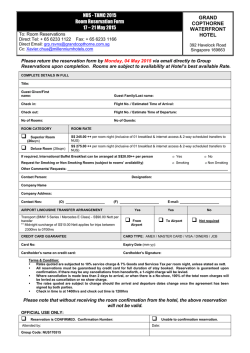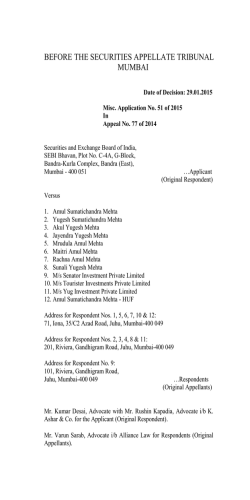
J-A10015-14 2015 PA Super 18 DONALD R. SISSON AND MARY
J-A10015-14 2015 PA Super 18 DONALD R. SISSON AND MARY SISSON, HIS WIFE IN THE SUPERIOR COURT OF PENNSYLVANIA Appellants v. JOSEPH STANLEY, HIS HEIRS SUCCESSORS, EXECUTORS, ASSIGNS, AND ANY PERSONS CLAIMING BY, THROUGH, OR FROM THEM Appellees No. 1347 MDA 2013 Appeal from the Order entered June 28, 2013 In the Court of Common Pleas of Susquehanna County Civil Division at No: 2010-620 C.P. BEFORE: DONOHUE, ALLEN, and STABILE, JJ. OPINION BY STABILE, J.: FILED JANUARY 27, 2015 Appellants, Donald R. Sisson and Mary Sisson, appeal from the June 28, 2013 order granting the motion for judgment on the pleadings of Appellees, the heirs of Joseph Stanley. We affirm. The parties dispute ownership of the right to mine Marcellus Shale gas underlying a 98.5 acre property (“the Property”) located in Susquehanna County, Pennsylvania. In 1953, Joseph Stanley transferred ownership of the Property to Pauline Battista subject to a reservation of “all of the oil and gas J-A10015-14 underlying the [Property].” Deed, 5/1/53.1 On March 6, 1986, Battista transferred the property to Appellants, subject to the same reservation. Chesapeake Appalachia, LLC, approached Appellants with a proposed lease agreement that would allow Chesapeake to extract the shale gas underlying the Property. Chesapeake advised Appellants of a cloud in their title based on the reservations of rights in the 1953 and 1986 deeds. On April 27, 2010, Appellants filed an action to quiet title 2 to clear the way for a profitable lease agreement with Chesapeake. The named defendants were “Joseph M. Stanley, his heirs, successors, executors, assigns, and any persons claiming by, through or from them. “ Complaint to Quiet Title, 4/27/10, caption. Also on April 27, 2010, Appellants filed a motion pursuant to Rule 430(a) of the Pennsylvania Rules of Civil Procedure requesting permission to serve the named defendants by publication. Appellants, by and through their counsel, conducted a brief search for defendants documented in a skeletal affidavit which in pertinent part states: I, Douglas P. Thomas, Esquire, having been duly sworn according to law, hereby depose and state that I am co-counsel for [Appellants], and that I have investigated the title and potential Defendant in this matter and that I have been unsuccessful in my attempts to locate the named Defendant ____________________________________________ 1 Appellants attached the Deed to their complaint as Exhibit B. 2 Rules 1061-86 of the Pennsylvania Rules of Civil Procedure govern actions to quiet title. Pa.R.C.P. Nos. 1061-68. -2- J-A10015-14 and/or his heirs, successors, personal representatives and/or assigns by doing the following: 1. Checking the public records in the Offices of the Recorder of Deeds of Susquehanna County, Pennsylvania; 2. Searching local telephone directories for the named Defendants or individuals with similar names; and 3. Checking various internet sites for the names and possible locations of the named Defendants. Affidavit, 4/27/10. The trial court granted Appellants’ motion and on May 5, 2010 Appellants published a notice of the pending action in the Susquehanna County Independent, a local newspaper. After no interested party came forward to defend against Appellants’ action, the trial court entered an order and decree, dated July 12, 2010, providing that the named defendants were forever barred from asserting any interest in the Property unless they brought an action in ejectment within 20 days. Order and Decree, 7/12/10. Again, no interested party came forward and on August 2, 2010, the trial court entered final judgment against the named defendants, forever barring them from asserting any interest in the property. On November 9, 2010, Rita Stanley Lupold (“Lupold”), claiming to be the sole surviving sibling of Joseph Stanley, came forward and filed a petition to open the judgment. Lupold alleged the trial court lacked jurisdiction to enter judgment because Appellants failed to effect proper service of process. The trial court agreed, and on December 28, 2010 entered an order opening the judgment. -3- J-A10015-14 Thereafter, Lupold filed preliminary objections, dated January 14, 2011, to Appellants’ complaint to quiet title. Appellants amended their complaint on February 3, 2011. Lupold filed preliminary objections to the amended complaint on February 22, 2011, and Appellants answered those objections on March 18, 2011. On July 28, 2011, the trial court entered an order overruling Lupold’s preliminary objections. On August, 17, 2011, Lupold filed an answer, new matter, and counterclaim to Appellants’ amended complaint. The new matter asserted that the applicable statute of limitations barred Appellants’ complaint, and the counterclaim asserted that the pending action prevented Lupold from profiting from the shale gas. Answer, New Matter, and Counterclaim, 8/27/11, at ¶¶ 50-64. On September 8, 2011, Appellants answered the new matter and counterclaim. After the parties were unable to resolve the matter at an April 17, 2012 pretrial conference, the trial court scheduled trial for August 27, 2012. Trial was continued several times and eventually scheduled for July 1, 2013. On June 4, 2013, Lupold filed a motion for judgment on the pleadings, asserting that no viable legal theory exists upon which Appellants could obtain the relief they seek. Appellants answered that motion on June 19, 2013 and on June 28, 2013 the trial court granted Lupold’s motion. timely appeal followed. Appellants raise three assertions of error: I. Should the lower court grant a Petition to Open a default judgment because of an insufficient search under Pa.R.C.P. 430 due to additional evidence being presented by the ‘after-found’ heirs, when the lower court already determined the -4- This J-A10015-14 Appellants conducted a sufficient good-faith investigation based upon Appellants’ affidavit and a hearing in accordance with [Pa.R.C.P.] 430? II. After a trial court rules on an affidavit of Good Faith Search pursuant to Pa.R.C.P. 430, notwithstanding said court’s ability to inquire about or conduct a hearing relative to such affidavit, should said court entertain after-discovered evidence to overturn the initial ruling, even if such action by the court effectively casts a cloud on every title ever acquired via a quiet title action served by publication? III. Is a Judgment on the Pleadings an acceptable ruling when the intent of the parties is put into question by the ‘Dunham[3] Rule,’ and its progeny, and such intent, regarding the extent of the reservation, remains a material issue of fact? Appellants’ Brief at 6-7.4 Appellants’ first two assertions of error address the trial court’s application of Pa.R.C.P. 430. Rule 430 governs motions for service by special order of court, including service by publication. Rule 430(a) provides that any such motion be “accompanied by an affidavit stating the nature and extent of the investigation which has been made to determine the whereabouts of the defendant and the reasons why service cannot be made.” Pa.R.C.P. 430(a). The Note to Rule 430(a) provides as follows: An illustration of a good faith effort to locate the defendant includes (1) inquiries of postal authorities including inquiries ____________________________________________ 3 Dunham and Shortt v. Kirkpatrick, 101 Pa. 36 (1882). 4 Nowhere in their brief do Appellants challenge the trial court’s compliance with Pa.R.C.P. 206.7, governing the procedure to be followed after the issuance of a rule to show cause. The Dissent’s discussion of that Rule is therefore inapposite. -5- J-A10015-14 pursuant to the Freedom of Information Act [. . .], (2) inquiries of relatives, neighbors, friends, and employers of the defendant, and (3) examinations of local telephone directories, voter registration records, local tax records, and motor vehicle records.” Pa.R.C.P. 430(a), note. In Deer Park Lumber, Inc. v. Major, 559 A.2d 941 (Pa. Super. 1989), the plaintiff filed an affidavit that “failed to provide any indication of the types of procedures used to locate [the defendants].” Id. at 944.5 Nonetheless, the plaintiff offered testimony indicating that it searched deed books, tax records, will books, and a voter registration list in Wyoming County. Id. at 945. The plaintiff located a deed subjecting the property at issue to a reservation of rights and listing the defendants’ address in Luzerne County. Id. The plaintiff filed its quiet title action in Wyoming County and made no effort to locate defendants in Luzerne County. Id. Construing the Note to Rule 430(a), this Court wrote: ____________________________________________ 5 Pursuant to Deer Park, the three-prong test applicable to petitions to open judgment does not apply where the “party seeking to open the judgment has not received valid service or notice of the proceedings.” Deer Park, 559 A.2d at 943. In such a case, “the court has no jurisdiction over the party and is powerless to enter judgment.” Id. In other words, the party seeking to open the judgment does not bear the burden of proving a meritorious defense. First we must analyze, as the Deer Park court did, whether service was proper under Rule 430. Thus, we disagree with the Dissenting Judge’s assertion that we have ignored the standard of review applicable to petitions to open a judgment. We believe Deer Park is directly on point and controlling, and therefore the better course is simply to apply Deer Park’s clear directive rather than go to great lengths to distinguish it away. -6- J-A10015-14 While by no means exhaustive, this Note is at least indicative of the types of procedures contemplated by the legislature when enacting Rule 430. In essence, it provides that more than a mere paper search is required before resort can be had to the publication provisions of Rule 430(b). Id. at 946 (emphasis added). Another party interested in the land, and also in possession of the information from the deed, traveled to Luzerne County and located an heir of the defendants in less than one hour. Id. This Court concluded the plaintiff’s failure to investigate outside of Wyoming County rendered its investigation inadequate. Id. Due process of law requires an adequate investigation for interested parties. Courts have repeatedly expressed the importance of proper service of process. “Service of process by publication is an extraordinary measure and great pains should be taken to ensure that the defendant will receive actual notice of the action against him.” Fusco v. Hill Fin. Sav. Ass’n, 683 A.2d 677, 680 (Pa. Super. 1996). “Due process, reduced to its most elemental component, requires notice.” PNC Bank, N.A. v. Unknown Heirs, 929 A.2d 219, 230 (Pa. Super. 2007). In both Fusco and PNC, counsel sought permission for alternative service even though they were aware of the identity of a potentially interested defendant. The Fusco Court criticized counsel’s action as “callous in the least and opportunistic at worst.” Fusco, 683 A.2d at 681. As our federal courts have observed: “Service of process is not a mere technicality. Rather, constitutional due process requires that service of -7- J-A10015-14 process be ‘reasonably calculated, under all circumstances, to apprise interested parties of the pendency of the action and afford them an opportunity to present their objections.’” Calabro v. Leiner, 464 F. Supp. 2d 470, 471 (E.D. Pa. 2006) (quoting Mullane v. Cent. Hanover Bank & Tr. Co., 339 U.S. 306, 314 (1950)). To this end, Rule 430(a) applies only where “service cannot be made” in the normal fashion. Pa.R.C.P. 430(a) (emphasis added). Based on the foregoing, we agree with the trial court’s conclusion that Lupold did not receive proper service of process. Under the rationale of Deer Park, Appellants’ affidavit is facially deficient.6 An examination of ____________________________________________ 6 The facial deficiency of the affidavit is our primary point of departure from the Dissent. Contrary to the Dissent’s assertion, we do not concede that a facially deficient affidavit constitutes compliance with Rule 430(a). In addition, the facial deficiency of the affidavit renders superfluous the Dissent’s discussion of Pa.R.C.P. 206.7. No discovery, evidentiary hearing or fact finding was necessary to find the affidavit facially deficient. Similarly, the E. J. Stanley will, discussed infra, is unnecessary to support a conclusion that Appellant’s affidavit is facially deficient. The apparent ease with which the trial court located the will is highly damaging to Appellants’ argument that they engaged in a good faith search pursuant to Rule 430. Nonetheless, the will alone was not the basis for opening the judgment. Appellants’ failure to search for the will, rather than the will itself, illustrates why their affidavit is facially deficient. Accordingly, our decision in this this appeal would be the same regardless of the will’s presence in the certified record. We address each of these points more fully throughout this Opinion. -8- J-A10015-14 each paragraph of this affidavit evidences a complete lack of due diligence and good faith to locate any of the named defendants to this action. 7 In paragraph 1, counsel indicates he searched the records in the Recorder of Deeds Office of Susquehanna County. In their action, Appellants named Joseph Stanley, his heirs, successors, executors, assigns, and any persons claiming by, through, or from them. One would presuppose that a good faith effort to locate heirs would include a search for records at the Register of Wills office. Although counsel notes that the Recorder of Deeds office in Susquehanna County also houses the Register of Wills, his affidavit only mentions a search of the Recorder of Deeds records. Counsel already had the relevant deeds to the property in which Joseph M. Stanley transferred real property to Pauline M. Battista subject to a reservation of rights in the underlying oil and gas. It is therefore not clear what counsel hoped to gain from his search of the Recorder of Deeds office. Regardless, ____________________________________________ 7 We are quite troubled by counsel’s description of his alleged additional efforts to locate Stanley or his heirs mentioned for the first time by counsel in his brief to this Court. See Appellants’ Brief at 7, 13-14. These extraneous efforts are not verified and dehors the record in this case. Since they were not before the trial court and not part of the certified record, this Court may not consider them. Counsel’s explanation that these efforts would have been discovered had the trial court inquired about them, id., deserves no comment other than to note it was incumbent upon counsel and it was counsel’s burden to specifically identify all efforts to locate Stanley and his heirs in his Rule 430(a) affidavit. Counsel further offers no explanation why these alleged additional efforts were not included in his affidavit. Nonetheless, as described infra, counsel failed to investigate even the most obvious of resources to locate any of the named defendants. -9- J-A10015-14 the affidavit does not indicate in any manner that a relevant search was performed to locate any wills or other probate records. A good faith search for heirs should have included at least this basic research. Had this been done, counsel would have found, as the trial court noted, the will of E.J. Stanley, Joseph’s father, which identified no fewer than twelve siblings to Joseph.8 ____________________________________________ 8 The trial court relied on the will without objection from Appellants. We observe that under Pa. Rule of Evidence 201(b)(2), the trial court can take judicial notice of a fact “not subject to reasonable dispute because it can be accurately and readily determined from sources whose accuracy cannot be questioned.” Rule 201(e) permits parties an opportunity to be heard on the propriety of taking judicial notice upon timely request. Pursuant to Rule 201, courts can take notice of public documents. For example, in Pocono Summit Realty v. Ahmad Amer, LLC, 52 A.3d 261 (Pa. Super. 2012), a quiet title action, the trial court took judicial notice of a subdivision plan that plaintiffs referenced but failed to attach to their complaint. Id. at 267 n.2. This Court affirmed, adopting the trial court’s opinion. Id. at 266. Likewise, in Bykowski v. Chesed Co., 625 A.2d 1256 (Pa. Super. 1993), this Court held that in reviewing an order granting judgment on the pleadings, the trial court could take judicial notice of information from the Lehigh County Recorder of Deeds office. Id. at 1258 n.2. At issue in Bykowski was ownership of certain real estate and improvements thereon. Here, the trial court did not expressly take judicial notice of the will, nor did it cite to Rule 201 or any of the aforementioned case law. Regardless, the trial court plainly had authority to rely on the will, which was on file at the Susquehanna County Register of Wills office, and it did so without objection. The will has been incorporated into the certified record. The Dissent’s reliance on Chaplin v. Colavecchi, 423 A.2d 8 (Pa. super. 1980) is misplaced. There, the trial court decided disputed issues of fact based on its own assessment of records from the local recorder of deeds’ office. Id. at 9. Chaplin was a trespass action involving a boundary (Footnote Continued Next Page) - 10 - J-A10015-14 Concerning paragraph 2 of the affidavit, counsel apparently did not consider that some or all of Joseph M. Stanley’s heirs could have moved since 1953. A search of local telephone directories is certain to be fruitless if any surviving heir is no longer local. Certainly, the age of the 1953 Deed and Appellants’ naming all heirs as defendants suggests searches of other records, such as obituaries, should have been performed. In their petition to open and/or strike, Appellees assert a simple search of the local newspaper obituaries would have revealed Joseph’s death and identified his surviving sister, nieces and nephews.9 Yet, counsel did not perform this seemingly logical search. We are not setting forth a per se rule requiring an obituary search for possible heirs, but in this case counsel’s failure to check local (Footnote Continued) _______________________ dispute. Id. Instantly, the trial court did not analyze the substance of the will in order to decide a disputed issue of fact. Rather, the trial court noted Appellants’ Rule 430 affidavit contained “no mention” of the will. Order, 12/29/10. The trial court was bound to assess the diligence of Appellants’ purported good faith search for heirs. Thus, the trial court’s decision rested on Appellants’ failure to discover an easily discoverable document, not on the contents of the document itself. 9 The absence of the obituary from the certified record is of no moment. As noted above, Appellees’ did not bear the burden of establishing a meritorious defense in order to open the judgment. The record contains no evidence that counsel searched obituaries. Counsel’s failure to do so is relevant to our analysis of the adequacy of their search for interested parties. Indeed, counsel’s appellate brief asserts he was unable to confirm that Joseph M. Stanley was deceased. Appellants’ Brief at 8. To make this assertion without having searched for an obituary further underscores counsel’s lack of diligence. - 11 - J-A10015-14 death record resources illustrates how his efforts so clearly fell below the reasonable due diligence necessary to justify service by publication. Finally, with regard to paragraph 3, counsel’s complete failure to identify which Internet sites he visited or what searches he ran provides no basis upon which to ascertain if counsel exercised due diligence and good faith in his efforts to locate Joseph Stanley’s heirs. Given the ease of identifying and using sophisticated Internet services to trace ancestry and family history, it is inconceivable that counsel, employing good faith efforts, was unable to locate a single Stanley heir. Counsel’s attempt to locate any of the named defendants to this action does not demonstrate even a minimal effort to conduct a search of those resources identified to the Note to Rule 430(a). Resources noted to Rule 430(a) include inquiries of postal authorities, inquiries pursuant to the Freedom of Information Act, inquiries of relatives, neighbors, friends, and employers of the defendant, and examinations of local telephone directories, voter registration records, local tax records, and motor vehicle records. Pa.R.C.P. 430(a), note. With the exception of a non-specific reference to local telephone directories, counsel’s affidavit falls woefully short of even the minimal good faith efforts suggested under Rule 430(a). Counsel’s search in Deer Park, which this Court deemed insufficient, included local “deed books, tax records, will books, and a voter registration list.” Deer Park, 559 A.2d at 945. That search, though defective, was - 12 - J-A10015-14 more thorough than the one documented in counsel’s affidavit. In particular, we note that the Deer Park search included will books. Instantly, as explained by Appellees, a search of will books in the Susquehanna County Register of Wills office would have revealed the will of E. J. Stanley, devising real property to his son Joseph M. Stanley.10 E. J. Stanley’s will also identifies twelve siblings of Joseph M. Stanley, each of whom received a devise of real property or a bequest of money. The last surviving sibling has come forward to challenge Appellants’ quiet title action. Here, as in Deer Park, a very simple and minimal investigation would have revealed to Appellants the identity of potentially interested parties. 11 Given the sparse information included in counsel’s affidavit, and the seeming ease with which counsel could and should have located interested parties, we agree with the trial court’s conclusion that counsel’s investigation ____________________________________________ 10 Appellants argue in their brief that “no estate records were ever filed for Mr. Stanley.” Appellants’ Brief at 8. Appellants do not explain counsel’s failure to locate the will of Joseph M. Stanley’s father. 11 The Dissent’s distinction of Deer Park is unavailing. The Dissent argues Deer Park is distinguishable because the appellee there did not file any motion or affidavit purporting to comply with Rule 430. Here, the Dissent argues, Appellants complied with rule 430 because they filed a motion and affidavit. Dissenting Opinion at 4. The Dissent ignores the Comment to Rule 430 and the Deer Park Court’s analysis of the Comment, both of which we addressed in the main text. Compliance with Rule 430 requires more than a pro forma motion accompanied by a superficial, facially insufficient affidavit. The affidavit here was deficient on its face. - 13 - J-A10015-14 was insufficient to allow service by publication.12 A contrary result would have Appellees forfeit their property rights as a penalty for Appellants’ failure to exercise due diligence in their search for interested parties.13 Next, we address the trial court’s entry of judgment on the pleadings in favor of Appellees. The trial court concluded that Joseph M. Stanley’s reservation of “all of the oil and gas underlying the said land” plainly applies to the shale gas now at issue. Deed, 5/1/53. Appellants argue that drilling for shale gas was unheard of in 1953, and therefore Joseph M. Stanley could not have intended to reserve rights to shale gas. Entry of judgment on the pleadings is appropriate “when there are no disputed issues of fact and the moving party is entitled to judgment as a ____________________________________________ 12 Appellants miss the mark with their assertion that the trial court should not have revisited its decision to permit service by publication. As this Court made clear in Deer Park, the trial court lacks jurisdiction to enter judgment against a party who has not received valid service of process. Deer Park, 559 A.2d at 943. We discern no error in the trial court’s decision to assess whether it had personal jurisdiction over Rita Stanley Lupold after she came forward and filed her petition to open the default judgment. 13 Given the current climate to find and secure properties for gas exploration in the Marcellus Shale formation in Pennsylvania, it would not be unexpected to see many more attempts like those made by Appellants here to challenge property rights for the profit to be made in this industry. Given this pressure, it is imperative that courts be vigilant to ensure that good faith efforts are properly scrutinized, documented, and verified before authorizing service by publication. The failure to do so may leave property owners unaware that their property rights have been extinguished by operation of law, without their actual knowledge, and without the due process to which they are entitled. - 14 - J-A10015-14 matter of law.” Consolidation Coal Co. v. White, 875 A.2d 318, 325 (Pa. Super. 2005). Our scope of review is plenary and we will reverse only if the trial court committed a clear error of law or if the pleadings disclose facts that should be submitted to a trier of fact. Id. “We accept as true all wellpleaded allegations in the complaint.” Id. The pertinent facts are not in dispute. Rather, the parties debate proper construction of the 1953 Deed under pertinent case law. Our Supreme Court has set forth rules applicable to the construction of a deed: (1) that the nature and quantity of the interest conveyed must be ascertained from the instrument itself and cannot be orally shown in the absence of fraud, accident or mistake and we seek to ascertain not what the parties may have intended by the language but what is the meaning of the words; (2) effect must be given to all the language of the instrument and no part shall be rejected if it can be given a meaning; (3) the language of the deed shall be interpreted in the light of the subject matter, the apparent object or purpose of the parties and the conditions existing when it was executed. Highland v. Commonwealth, 161 A.2d 390, 402 (Pa. 1960). Appellants cite Butler v. Powers Estate, 65 A.2d 885 (Pa. 2013), for the proposition that a reservation of mineral rights is to be construed according to the understanding of the parties at the time of the reservation. Appellants’ Brief at 17-18. The Butler Court applied the Dunham Rule, which is as follows: Pennsylvania law has long recognized a rebuttable presumption that if, in connection with a conveyance of land, there is a reservation or an exception of minerals without any specific mention of natural gas or oil . . . the word minerals was not intended by the parties to include natural gas or oil. This - 15 - J-A10015-14 precept, commonly known as the Dunham Rule, may be rebutted by a challenger through clear and convincing evidence that the intent of the parties, at the time of the conveyance, was to include natural gas and/or oil. Butler, 65 A.3d at 888 (internal citations and quotation marks omitted). The rationale behind the Dunham Rule is that oil is not included in a reservation of mineral rights because oil is not commonly understood to be a mineral. Id. at 890. The parties in Butler disputed whether a deed reserving “minerals and Petroleum Oils” included a reservation of natural gas. Id. at 886-87. Ultimately, the Supreme Court concluded the language in the reservation was not sufficiently specific to include natural gas, in particular the Marcellus Shale gas that was at issue in that case. Id. at 899. Butler is clearly distinguishable from the instant case, as the reservation in the 1953 Deed refers specifically to gas. Thus, the Dunham Rule – creating a rebuttable presumption that a reservation of mineral rights does not include a reservation of rights to the gas – has no application here. Appellants also rely on United States Steel Corp. v. Hoge, 468 A.2d 1380 (Pa. 1983) (“Hoge II”). There, U.S. Steel owned a subterranean coal seam. Id. at 1381-82. The deed granting U.S. Steel the right to mine the coal reserved for the grantor the right to “drill and operate through said coal for oil and gas.” Id. at 1382. At issue was ownership of the coal bed gas. Considered a dangerous byproduct and - 16 - not commonly commercially J-A10015-14 exploited at the time of the deed, exploitation of coal bed gas subsequently became commercially viable. Id. at 1384. The Supreme Court concluded U.S. Steel owned the coal seam gas. “[A]s a general rule, subterranean gas is owned by whoever has title to the property in which the gas is resting.” Id. at 1383. When a landowner conveys a portion of his property, in this instance coal, to another, it cannot thereafter be said that the property conveyed remains as part of the former’s land, since title to the severed property rests solely in the grantee. In accordance with the foregoing principles governing gas ownership, therefore, such gas as is present in coal must necessarily belong to the owner of the coal, so long as it remains within his property and subject to his exclusive dominion and control. The landowner, of course, has title to the property surrounding the coal, and owns such of the coalbed gas as migrates into the surrounding property. Id. at 1383. Furthermore, the Supreme Court concluded that it “strains credulity” to believe the grantor intended to reserve the right to a gas that was dangerous and not commercially valuable at the time of the grant. Id. at 1385. Appellants assert the existence of Marcellus Shale gas was unknown and its commercial exploitation was not possible in 1953. Thus, Appellants argue Joseph M. Stanley could not have intended to reserve the right to shale gas in 1953. We believe Hoge II is distinguishable from the instant case, and that it fails to support Appellants’ argument for several reasons. First, the Hoge II Court addressed a subdivided mineral estate, with one party owning coal and the other party owning oil and gas. Instantly, by way - 17 - J-A10015-14 of contrast, Joseph M. Stanley’s reservation retained all of the gas underlying the land. It is not necessary in this case to distinguish between gas in a coal vein from gas found in any other strata. The 1953 Deed, by its plain language, reserves all of the gas. Second, the Butler Court’s analysis of Hoge II is fatal to Appellants’ argument. In Butler, the appellee relied on Hoge II to argue that since it owned the shale it owned the shale gas. That is, the appellee argued that shale is undisputedly a mineral, and that the appellee owned the shale by virtue of the reservation of mineral rights. Pursuant to Hoge II, therefore, the appellee believed it owned the gas in the shale. The Supreme Court disagreed. The Court reasoned that the Hoge II Court treated coal bed gas distinctly from natural gas in that it is toxic and was once considered a dangerous waste product. Butler, 65 A.3d at 888-89. Shale gas, on the other hand, is “merely natural gas that has become trapped within the Marcellus Shale, rather than rising to the more permeable sand formations below the surface.” Id. at 889. Further, the Butler Court found no significance in the methods needed to extract shale gas, as “the basis of the Dunham Rule lies in the common understanding of the substance itself, not the means used to bring those substances to the surface.” Id. To summarize, the 1953 Deed expressly reserved to Joseph M. Stanley the rights to all gas. Appellants do not contend the word gas is insufficient to encompass natural gas. To hold otherwise would violate the rules of - 18 - J-A10015-14 construction expressed in Highland. Marcellus Shale gas is simply natural gas trapped in shale. We therefore conclude that the trial court did not err in entering judgment on the pleadings in favor of Appellees, as they own the rights to the shale gas pursuant to the plain language of the reservation in the 1953 Deed. Order affirmed. Judge Allen joins in the opinion. Judge Donohue files a dissenting opinion. Judgment Entered. Joseph D. Seletyn, Esq. Prothonotary Date: 1/27/2015 - 19 -
© Copyright 2026
